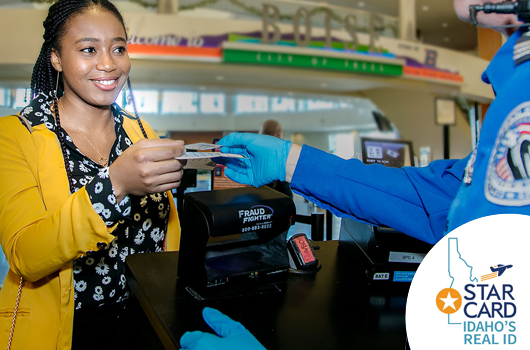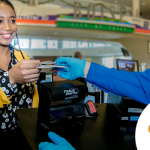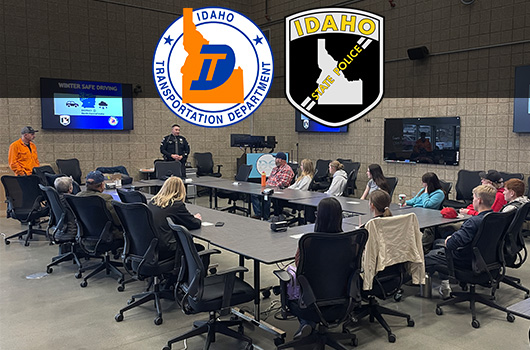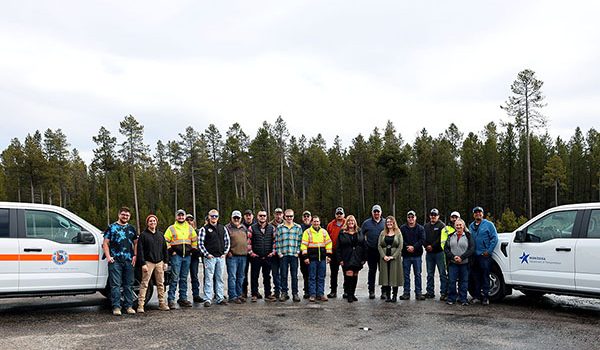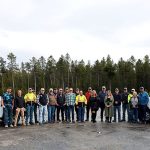The Idaho Transportation Department will begin utility potholing work next Monday as part of the Elijah Drain culvert repair project beneath State Highway 45 (12th Avenue). Potholing is the process of digging small, targeted holes to safely locate underground utilities before construction begins.
Crews will pothole to locate underground utilities ahead of construction planned for later this month. This work is necessary to avoid conflicts with utilities during full construction and to reduce the risk of unexpected delays later in the project.
Drivers can expect intermittent lane closures on SH-45 while crews complete the work. Access to nearby businesses, including parking and drive-thru operations, will remain open.
Construction on the full culvert repair is expected to be complete by April 2026.
Motorists should plan ahead and check 511.idaho.gov for traffic impacts and updates.
A vehicle carrying a load that exceeded height restrictions struck Vinyard Bridge on Interstate 84 this morning. Currently, eastbound traffic on I-84 is reduced to a single lane.
The Idaho Transportation Department will reduce lanes on I-84 and close Vinyard Bridge until a damage assessment is completed. The damage assessment will determine if the bridge can bear weight or needs to be replaced.
This is the second time in two years that the Vinyard Bridge has been struck by an over-height load. In 2024, Vinyard Bridge was struck by heavy equipment. Those repairs were scheduled to be complete by the end of this year. This strike and road closures are not related to the 2024 incident.
Check 511.idaho.gov, or the Idaho 511 app for up-to-date traffic information.
BOISE – Starting Feb. 1, 2026, the Transportation Security Administration will impose a $45 fee on passengers traveling without a REAL ID-compliant identification card, such as Idaho’s Star Card, or another acceptable document. The fee applies to both international and domestic travel.
TSA officials emphasized that payment does not guarantee verification. Travelers whose identities cannot be confirmed may be denied entry at the security checkpoint. If approved, the verification is valid for a 10-day travel period. The fee can be paid online before arriving at the airport or at the airport before entering the security line, though officials warn the process may take up to 30 minutes.
Passengers presenting a state-issued identification that is not REAL ID compliant, and who do not have another acceptable alternative such as a passport, should expect delays, additional screening, and the possibility of being turned away.
“Our goal is to help customers travel efficiently and securely,” said Lisa McClellan, DMV Administrator. “Planning ahead and bringing the right documents ensures a smoother trip and avoids unnecessary fees or delays.”
Idaho residents are strongly encouraged to obtain a Star Card well in advance of their travel plans. Customers must bring the required documents in order to receive a Star Card. If all necessary documents are not presented, the card cannot be issued. A complete checklist is available at itd.idaho.gov/starcard, and residents are urged to review it before visiting the DMV.
Many Idaho DMV offices operate by appointment only. Residents should check with their local county driver’s license office before visiting. It is important to note that many Motor Vehicle offices offer REAL ID services in addition to the Driver’s License offices to help Idahoans obtain their REAL ID. The Ada County Motor Vehicle office on Chinden Blvd, Canyon County Motor Vehicle Office, and Clearwater Motor Vehicle have the ability to issue renewals and REAL ID upgrades. There is no additional fee for adding the STAR to your renewal or replacement to make it REAL ID compliant. Renewal/duplicate fees apply. Once issued, physical cards may take up to two weeks to arrive by mail, so travelers should plan accordingly.
Other acceptable forms of identification can be found on TSA’s website at tsa.gov/travel/security-screening/identification.
The Idaho Transportation Department has selected 12 winners from its second annual Name a Snowplow contest! The names will be featured on 12 plows across the state. The winners are:
North Idaho:
- CtrlSaltDelete, Mullan School District, teacher Kristy Dykes
- SnowbiWanKenobi, Post Falls High School, teacher Denae Glenn
North-Central Idaho:
- Blizzard Basher, Genesee School District, teacher JR Morrow
- Frosty, Salmon River Jr.-Sr. High School, teacher Ms. Mayes
Southwest Idaho:
- Austin Plowers, Idaho Virtual Academy, teacher Michelle Mattson
- Betty WhiteOut, Idaho Virtual Academy, teacher John Benson
South-Central Idaho:
- Blizzard Wizard, Shoshone Schools, teacher Mark Sant
- Scoopy Doo, East Minico Middle School, teacher Mitchell Young
Southeast Idaho:
- Sleetwoodmac, Franklin Middle School, teacher Josh Nielsen
- Snowzilla, Idaho Virtual Academy, teacher Becky Ipsen
East Idaho:
- Fast&Flurryous, Idaho Virtual Academy, teacher Mr. Henderson
- Catch my drift, Farnsworth Middle School, teacher Laura Walker
Names were submitted by sixth through twelfth-grade classrooms statewide, and ITD employees anonymously selected 12 winners.
Once the plow names are installed, ITD will coordinate educational visits with the winners to teach the students about snowplows and safe winter driving.
“We’re proud of the creativity and community spirit shown by Idaho’s students and teachers in naming our snowplows,” said ITD Director Scott Stokes. “These names help connect people to the important work our crews do every winter. When you see a plow out on the road, please remember to give them space so they can keep our highways safe for everyone.”
The Idaho Transportation Department and Idaho State Police are teaming up to provide a free, informative and engaging winter driving safety class on Saturday, December 13 in Lewiston as the region prepares for icy roads and adverse weather.
The classes are designed to help drivers prepare for Idaho’s winter conditions by covering topics like vehicle readiness, proper equipment, defensive driving techniques, and how to safely share the road with snowplows. Instructors include state troopers and ITD operators who bring firsthand experience from years of working on Idaho’s roads and responding to emergencies during severe weather.
While these classes are open to everyone of all ages and skill levels, they are especially valuable for:
- Young drivers with limited winter driving experience
- New drivers, including those preparing to start driver’s education in the next year
- New residents facing their first Idaho winter
Lewiston Winter Driving Class event details:
- Saturday, December 13
- 10 a.m. – 12 p.m.
- ITD District 2 Office, 2600 Frontage Road, Lewiston, ID 83501 (The main entrance is on the south side of the building near the flag poles.)
- Register online here. Seating is limited. Additional courses may be scheduled later.
More information can be found on ITD’s website Travel page, itd.idaho.gov/travel.
The Idaho Transportation Department will close a single lane on Interstate 84 eastbound at the Gowen Road exit from 8 a.m. to 5 p.m. Tuesday to complete bridge repair work, weather permitting.
Work is required to be done during the day due to temperature requirements to effectively apply repair materials. A single lane will remain open, with traffic alternating between lanes as needed throughout the work period.
Work on the bridge was completed overnight earlier this summer. This daytime closure will allow ITD crews to finish the remaining repairs and restore the structure to full service.
Drivers should expect delays and are encouraged to plan ahead. For the most current traffic updates, visit 511.idaho.gov or download the ITD 511 app.
Starting Monday, the Idaho Transportation Department will be working along Eagle Road between Chinden Boulevard and Ustick Road to work on underground utilities for the installation of variable speed limit signs.
Motorists can expect lane closures from 10 p.m. to 6 a.m. until Dec. 10. Pedestrian traffic will be detoured to alternate routes along Eagle Road, Chinden Boulevard, and McMillian Road for daytime sidewalk and shoulder closures.
This work is part of the on-going effort to improve safety on Eagle Road. These variable speed limit signs will provide speed feedback for drivers and reduce speed limits during peak traffic times. The signs are expected to be operational within the next few months.
For more details about the VSL sign project, visit: https://itdprojects.idaho.gov/pages/eagle-road-safety-corridor
BOISE — As winter weather returns to Idaho, the Idaho Transportation Department and Idaho State Police are partnering to launch a statewide Winter Driving Safety Campaign. The initiative aims to reduce crashes and fatalities by promoting safe driving habits, snowplow awareness, and enforcement of seat belt and impaired driving laws.
“Each winter we see too many crashes that could have been avoided,” ISP Major Shawn Staley said. “Driving too fast for conditions and following too closely are among the top causes when roads are icy. And wearing your seat belt is the best defense in a crash–every time.”
Despite progress, 14% of Idahoans still aren’t buckling up. In recent years, unrestrained occupants accounted for a majority of fatalities in crashes statewide.
Holidays can be very tough for families who have lost someone. Wearing a seatbelt is proven to be the most effective way to survive a crash,” said Josephine Middleton, Highway Safety Manager at OHS. “Talk to your family about buckling up every time they get into a vehicle to avoid an unnecessary tragedy.”
In addition to seat belt patrols, ISP will conduct emphasis patrols targeting impaired driving. In Idaho, 86 lives were lost to impaired driving in 2024.
Drivers are urged to follow these safety tips:
- Always wear a seat belt.
- Never drive impaired; plan a sober ride in advance.
- Slow down and increase following distance in snow, ice, or rain.
- Avoid distractions and stay alert for changing conditions.
- Give plows lots of room to work. The majority of snowplow strikes involve another vehicle passing too close or following too close and running into the plow. The front plow is 12 feet wide, and a wing plow is 10 feet wide on the right. Plows also have large blind spots.
ITD encourages drivers to prepare vehicles with snow tires, emergency kits, and full fuel tanks. Before traveling, check road conditions at 511.idaho.gov and monitor forecasts at weather.gov.
Together, ITD and ISP are working to ensure every journey ends safely.
ITD, MDT, DOT, ISP- there were a lot of letters, different job titles and laughter floating around the Island Park shed recently, as the Idaho Transportation Department hosted the Montana Department of Transportation for a partnership lunch.
The Ellis and West Yellowstone maintenance sheds, and others from Montana Butte District 2, joined ITD Ashton/Island Park foreman Ryan Wright and his crews on Wednesday, November 5. Many ITD leadership, including District Engineer Jason Minzghor, Engineering Manager Karen Hiatt, Engineering Manager Bryan Young, and Operations Engineer Jeremie Pettingill, participated as well. Island Park-stationed Idaho State Police trooper Braiden Hill also joined the group.
The get-together served to allow Operations divisions to meet face to face and discuss ways both states can continue to help each other plow snow, respond to wildfire closures, and much more at the border of the two states. The lunch marked the first time that many of those in attendance had met in person before.
This past summer, many of them spoke often as State Highway 87 was closed for response to the Horn Fire that burned nearly 3,000 acres.
Through laughter and casual conversation over good food, along with professional exchanges and discussion, MDT and ITD folks left better prepared for the winter and year ahead.
The Island Park area and corridor of US-20 to West Yellowstone receives one of the greatest and longest lasting amounts of snow in Idaho. The routes attract a huge influx of year-round recreationists and are lifelines to communities in both states.
This partnership lunch will continue to be held annually, with ITD intending to travel to Montana’s turf next year.
The Idaho Transportation Department is approaching a major milestone towards completion of the Interstate 90, State Highway 41 Interchange in Post Falls. Starting Friday traffic will be able to use the new westbound off-ramp to exit I-90 onto SH-41. The temporary signal at the Seltice Way Interchange will be removed.
This off ramp was closed in early March to allow crews the space needed to construct the new Single Point Urban Interchange signal and the new off ramp lanes.
- Motorists exiting I-90 headed north on SH-41 will bypass the intersection and merge right with northbound traffic.
- Motorists exiting I-90 headed south on SH-41 will arrive at the signal and wait to turn left through the intersection.
Watch a video to learn more about the new interchange routes.
The next step in this project is to open all remaining lanes of SH-41, which is expected to happen in spring of 2026.
ITD appreciates the community’s ongoing patience and safe driving during construction of this project.
For more information, visit the project website at itdprojects.idaho.gov/pages/i90sh41ic, email info@i90corridor.com or call 208-738-4190.





